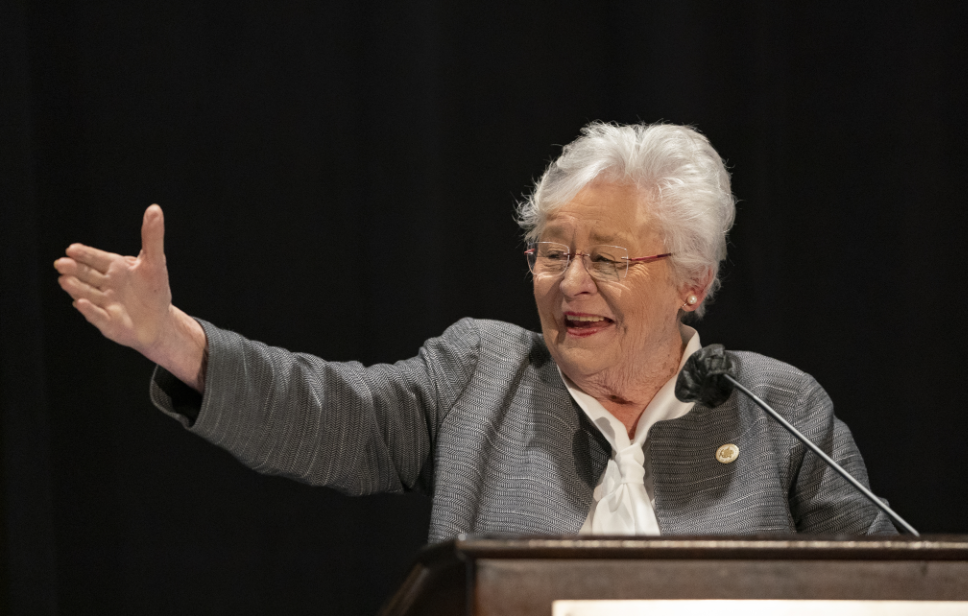Katie Britt, Marco Rubio, and colleagues introduce bills to crack down on fentanyl distributors and human smugglers

On Friday, U.S. Senator Katie Britt, the ranking member of the Homeland Security Subcommittee of the Senate Committee on Appropriations, joined Senator Marco Rubio in introducing two pieces of legislation to crack down on criminal activity at the nation’s southern border. While drug cartels and human traffickers are making $billions exploiting the porous southern border, currently, under federal law, there are only vague criminal offenses that address the encouragement, inducement or aiding and assisting of unlawful entry into the U.S. In response, Sens. Britt, Rubio, and five colleagues introduced the No Coyote Cash Act to criminalize payments made with the intent of financing unlawful entry into the U.S. and to penalize convicted foreign aliens who have violated this law by making them deportable and inadmissible for reentrance. “With a record number of Americans dying from fentanyl poisoning, record deaths among migrants attempting to cross the border, record profits by the cartels, and a record amount of people on the terrorism watchlist apprehended at the border, there is no doubt that this is a crisis unlike which we have ever seen,” said Sen. Britt. “It is critical that we end incentives and loopholes that are encouraging people to break the law and game the system. This bill would protect vulnerable children, women, and men from being exploited by dangerous criminals while also helping stem the tide of immigrants illegally flooding across our porous southern border.” The CDC estimates more than 107,000 people died of a drug overdose in the 12-month period ending August 2022. Illicit fentanyl remains the leading cause of death among Americans aged 18 to 45. Fentanyl is 50 times more potent than heroin. According to the U.S. Drug Enforcement Administration, drug dealers increasingly target children, teenagers, and young adults with fentanyl pills that look like candy and common prescription medication. Drug dealers lace marijuana, heroin, and even Ritalin with fentanyl. The amount of fentanyl seized in Birmingham alone last year reportedly was enough to kill every single person in the state of Alabama. Alabama schools administering Narcan to students because of an overdose of opioids is becoming increasingly commonplace. In response to the surge of illicit fentanyl being trafficked across our southern border and into our communities, Sens. Britt, Rubio, and 13 of their Senate colleagues have reintroduced the Felony Murder for Deadly Fentanyl Distribution Act. The bill makes the distribution of fentanyl, resulting in death, punishable by federal felony murder charges. “Fentanyl is stealing lives and devastating families in every corner of Alabama and America,” Senator Britt stated. “This crisis is infiltrating our schools and our communities, and it is past time that we hold the criminals profiting off of this poison accountable. This legislation is an important part of comprehensively addressing the supply of and demand for fentanyl in our country, so we can keep our children safe and our future strong.” Britt has prioritized border security and public safety during her first seven weeks in office. She introduced a robust package of four pieces of legislation and has already cosponsored an additional four bills related to the topic. Britt won a landslide victory in the 2022 election, easily besting her Democratic and Libertarian opponents. To connect with the author of this story or to comment, email brandonmreporter@gmail.com.
State Superintendent warns that financial cliff is 18 months away as federal Covid relief dollars run out

The federal government has flooded the state with billions in COVID relief dollars through the CARES Act and the American Rescue Plan Act. Nowhere has more one-time money flooded into budgets than in public schools. “Those funds are going away in time,” said State Superintendent Eric Mackey addressing the Permanent Joint Legislative Committee on Finance and Budgets-Education on Thursday. “We are going to have that funding cliff that we have been talking about,” Mackey said. “There are three tranches of federal money: Cares round one, Cares round 2, and then the American Rescue Act,” Mackey explained. “That money has to be spent by September 2024. The is only 18 months away.” “In 2021 and 2022, you gave us the funding for summer reading camps – about $18 million a year,” Mackey said. “We have used federal set aside funds in 2023 and 2024.” Much of those federal dollars went to local school systems directly, and that money was not appropriated by the Legislature, so it is being spent by local school boards and local school administrators. Mackey warned that the federal government encouraged systems to use that one-time money to add staff, but there is no long-term funding mechanism for continuing to pay for those positions once the one-time money is exhausted. “If you hired a teacher with these funds, you would for certain run out of money by September 2025, and it could be sooner than that,” Mackey said. Mackey said the State Department of Education has a COVID relief dashboard on its website. There you can see the federal dollars that went to every school district, how much of that money is left, and how it has been spent. Mackey used Gulf Shores in Baldwin County as an example. “Gulf Shores has spent 66% of their federal funds,” Mackey said. “They were given $50.04 million between all three tranches (of money). $33 million has already been spent. Some districts have only spent 25 percent of their money. In some rural districts, they can’t find the people. The teacher shortage is one issue. In some cases, they can’t find teacher aides in their communities. I never thought I would see the day where we had more money but can’t find the people.” “The last tranche of money runs out in September 2024,” Mackey said. The money presently has to be spent by then. Mackey explained, however, that if they contracted to buy a piece of equipment, but due to supply chain issues, it has not arrived yet. The system could still use those federal dollars for that purchase even if it does not occur until after the September 30, 2024, deadline. Mackey is optimistic that the U.S. Treasury will allow the state and school systems to have another year to spend all of that one-time federal money, but presently the deadline is still September 30, 2024. None of this is a problem in the fiscal year 2024 budget that the Legislature will prepare to go into effect on October 1. The fiscal cliff comes into effect in the 2025 fiscal year budget when school systems look to the state or their local school boards to make up those funds, or schools will have to cut positions and programs funded with these one-time federal dollars. In the 2023 education trust fund (ETF) budget, the Legislature appropriated $8,261,590,649 for education, an increase of $589,014,074 from fiscal year 2022. The 2023 Alabama Legislative Regular Session begins on Tuesday, March 7. To connect with the author of this story or to comment, email brandonmreporter@gmail.com.
Terri Sewell announces $500,000 for student initiatives at Birmingham-Southern College

On Wednesday, Congresswoman Terri Sewell announced that Birmingham-Southern College (BSC) had been awarded $500,000 in federal funding for an experiential learning and civic engagement student initiative. Sewell was joined by BSC President Daniel Coleman and members of the student body for the funding announcement. “I was so proud to present a check for half a million dollars in federal funding to Birmingham-Southern College for experiential learning and student support,” said Rep. Sewell. “My team and I fought hard to ensure that funding for this project was included in this year’s government funding package so that students can benefit from high-impact internships and jobs during their time at BSC and beyond. Birmingham-Southern is a pillar of our community, and I urge our partners at the state and local level to do what they can to support this cherished institution and its students during this critical time.” At Wednesday’s press conference, Sewell presented a check for $500,000 to President Coleman and members of the student body. This funding is part of the $42.8 million Sewell helped secure in the Fiscal Year 2023 government funding package for local projects in Alabama’s Seventh Congressional District. The $500,000 in federal funding will strengthen the institution’s ability to facilitate placement in high-impact internships and jobs through multiple offerings of the Krulak Institute for Leadership, Experiential Learning and Civic Engagement on campus. Birmingham Southern College has recently made headlines over its well-documented financial difficulties. President Coleman has asked the Legislature, as well as the City of Birmingham and Jefferson County, for a substantial financial bailout. The small private college has been a fixture in Birmingham for over a century and has a broad alumni base. “Those efforts continue daily — even hourly — and have been encouraging enough to keep us moving forward with the plan,” BSC President Coleman said recently. “While we all wish we had a final (and positive) answer by now, the simple truth is that when public funds are involved, there are many, many moving parts and decision-makers. So we are working closely with our allies in Montgomery and statewide, and we expect to know something more definitive by the time the Alabama Legislature convenes on March 7, if not before.” The State Legislature will likely take up appropriating the ARPA money early in the Alabama regular legislative session that begins in less than two weeks. Sewell is in her seventh term representing Alabama’s Seventh Congressional District. She has been supportive of BSC and its efforts to seek taxpayer assistance to remain open. To connect with the author of this story or to comment, email brandonmreporter@gmail.com.
Nucor Corp. plans $125 million facility, creating 200 jobs in Decatur

Governor Kay Ivey on Wednesday announced that Nucor Corp. plans to invest approximately $125 million to open an advanced manufacturing facility in Decatur. There, a new business unit – Nucor Towers & Structures, will produce transmission towers. “Alabama offers world-class companies like Nucor all the advantages they need to find success, including a skilled workforce, a pro-business environment, and a solid support system,” said Gov. Ivey. “This investment project is a win for Nucor, Decatur, and all of Alabama.” The new plant will create 200 full-time jobs. The positions will have an average annual compensation of $75,000 and will be filled over a four-year period. Leon Topalian is the Chair, President and CEO of Nucor Corp. “We are very excited to be building this new tower production plant in Alabama, where Nucor has a long history and presence throughout the state,” said Topalin. “As America’s most diverse industrial manufacturer of steel products, we will be able to efficiently supply this new plant, helping to ensure that our nation’s critical energy and digital infrastructure is built with the cleanest, most sustainable steel in the world.” Charlotte, North Carolina-based Nucor already has a strong presence in Alabama. The company established the new business unit after it acquired both Summit Utility Structures LLC and Sovereign Steel Manufacturing LLC in 2022. The new division produces metal poles and other steel structures for utility infrastructure and highway signage. Nucor’s existing facilities in Alabama produce steel, tubular products, joists, and decking, as well as metal buildings. The company has locations in Birmingham, Tuscaloosa, Fort Payne, Eufaula, and Decatur. Economic developer Dr. Nicole Jones told Alabama Today, “Nucor and the steel industry have a long history and presence in Alabama. Nucor’s product lines serve an array of commercial customers in the fields of agriculture, automotive, construction, energy transmission, heavy equipment, infrastructure, transportation, oil & gas, and more. Nucor’s latest expansion, Nucor Towers & Structures, will be an advanced manufacturing facility that makes transmission towers. The company’s capital investment in Decatur will include land improvements, construction of a new building, and manufacturing equipment. The new plant will be located adjacent to the Nucor Steel Decatur sheet steel mill. Greg Canfield is the Secretary of the Alabama Department of Commerce. “Nucor Corp. has a long-standing manufacturing presence in Alabama, and it’s great to see the new Nucor Towers & Structures business unit commence operations in Decatur,” said Sec. Canfield. “Over the years, we’ve developed a strong partnership with Nucor, and I look forward to seeing our relationship expand with this new venture.” The new plant in Alabama will be highly automated. The factory will utilize efficient straight-line production and will also include advanced hot-dip galvanizing operations. Laurent De Mey is the General Manager of Nucor Towers & Structures. “We appreciate the support we have received from the state and local officials in Alabama, including Governor Ivey, the Alabama Department of Commerce, the State of Alabama State Industrial Development Authority, Morgan County Economic Development Association, Morgan County Economic Development Cooperative District, Morgan County, Decatur Industrial Development Board, City of Decatur, Decatur-Morgan County Chamber of Commerce, Hartselle Chamber of Commerce, and the Tennessee Valley Authority,” said De Mey. “We are excited to launch our expansion of this new Nucor business in the State of Alabama.” “The direct and indirect jobs resulting from Nucor’s expansion will provide significant economic benefits for Decatur, Morgan County, and our entire state,” Jones said. State Senator Arthur Orr serves as chairman of the Morgan County Economic Development Association. “It is a true vote of confidence in our community when an existing business decides to further expand its operations here. Our people are our strength in Morgan County,” said Sen. Orr. “We are grateful for the excellent job they do for employers like Nucor and others across the area.” Ray Long is the chairman of the Morgan County Commission. “This is a great company with a great reputation for working with us to make Morgan County a better place to live,” said Chairman Long. “We look forward to working with them to make sure this venture is successful,” said Long. “We are also thankful for the approximately $125 million investment and the 200 jobs created with a compensation of around $75,000,” said Decatur Mayor Tab Bowling. “Our local economic development office, along with its numerous partners, continue to work hard to bring new industries and quality jobs to Decatur. This is a prime example of that work.” “Metals and advanced materials are one of our state’s targeted business sectors,” Jones explained. “Alabama Department of Commerce data from 2021 shows primary metal manufacturing exports valued at approximately $1.3 billion, and fabricated metal manufacturing exports valued at $453 million.” To connect with the author of this story or to comment, email brandonmreporter@gmail.com.
Low number of corrections officers in Alabama prisons cause for concern

The Permanent Joint Legislative Committee on Finances and Budgets-General Fund met in Montgomery at the Alabama Statehouse for legislative oversight of state general fund agencies ahead of the legislative session. The Alabama Department of Department of Corrections (ADOC) has just 1,732 corrections officers to guard the state’s 20,643 inmates. ADOC is the second largest agency in the state general fund (SGF) budget. Alabama has an antiquated budgeting system where there are two budgets: the SGF and the education trust fund (ETF). ADOC Commissioner John Hamm was appointed by Alabama Governor Kay Ivey about 13 months ago. He previously served as the Deputy Secretary of the Alabama Law Enforcement Agency (ALEA) and as head of the State Bureau of Investigation. Hamm addressed the budget committees about his request for an additional $122.4 million in funding from the SGF for the 2024 fiscal year, which begins on October 1. The Department of Corrections appropriation in 2023 was $594,647,303. ADOC received $400 million in American Rescue Plan Act (ARPA) funding. Hamm said that the largest component of the ADOC budget is personnel. The lack of corrections officers is a public safety issue. Most importantly, it means that there are fewer guards to protect inmates from their fellow inmates. It is also a problem for the state legally as a federal court has already ordered ADOC four years ago to hire 2000 more guards – and the state has failed to accomplish that task. “One of our court orders says we must hire x number of security staff,” Hamm said. “I don’t know how we are going to make them come to work.” “This is also an issue with other states,” Hamm said.” Texas and Florida have gotten real aggressive on compensation. They are now well ahead of us. Recruiting corrections officers is coming from here. We are competing with sheriffs and police departments. Our compensation is lower and the benefits. Some of them are paying in the $50s and even $60s. We are 50% lower than that.” Hamm said that there have been some signs of progress though, recently. “We had about eight quarters of decline. We leveled off last quarter,” Hamm said, suggesting that this may indicate a turnaround. Hamm said that the Department had 688 vacancies for corrections officers, with just 1732 guards presently on staff. ADOC also has 1168 administrative workers with 264 vacancies. One legislator suggested that ADOC simply train prisoners how to be corrections officers to fill the vacancies. Hamm said that there are APOST standards for corrections officers that would prevent ADOC from hiring former prisoners as guards. ADOC is building two new mega prisons. Hamm said that the mega prison in Elmore County has poured its foundation pad, but now they have to put in the drains and plumbing before construction can begin. “It is on our Draper campus in a 300-acre site,” Hamm said. “The general contractor – Caddell construction – is on site. Soon there will be 800 workers out there. Hamm suggested that sinkholes on the site and drainage had slowed the project. “Site work is ongoing at Escambia County,” Hamm said. “We don’t have a general contractor for Escambia yet.” Hamm predicted that the state would be able to hire a general contractor once they finalized the design at Elmore. That design will then be duplicated at Escambia, saving money. Two legislators asked about the controversial decision to award the prison healthcare contract to a new company that appears to simply be an old company in several pieces of litigation due to walking out on prison healthcare contracts in other states. Rep. Arnold Mooney asked if YesCare was simply Corizon reorganized. “YesCare is a new company,” Hamm insisted. Hamm told the legislators that there are only five companies in the country that provide large-scale healthcare services for prisons and that four of those submitted bids. A committee was tasked with evaluating the four bids, and they recommended two companies. Hamm said that it was his decision to accept the bid from YesCare. “I made the choice of Yes Care,” Hamm said. The Department of Justice is suing the State of Alabama, claiming that the conditions in Alabama’s prisons are so bad that imprisonment in the state’s prisons constitutes cruel and unusual punishment under the Eighth Amendment, and as such imprisonment under the conditions found in ADOC is unconstitutional. To connect with the author of this story or to comment, email brandonmreporter@gmail.com.
USA Health announces new mother/baby postpartum unit

USA Health recently announced that they will soon open a new Mother/Baby Unit designed to promote comfort and bonding for families and their newborns. The 20-suite postpartum unit is located on the fifth floor of the women’s tower at Children’s & Women’s Hospital, the area’s leader in births. Deborah Browning. M.S.N., R.N., C.E.N.P, is the interim administrator for the hospital. “This beautiful new unit is another example of how Children’s & Women’s Hospital focuses on providing high-quality care that is patient-centered,” said Administrator Browning. The new unit is designed to facilitate what the industry calls – ‘couplet care.’ That is defined as a family-centered approach in which mother and baby are cared for in the same room by the same nurse from the time a baby is born until both are ready to go home. The latest research has shown that couplet care creates a stronger bond between parents and their newborns, builds a baby’s immunity, and increases success rates for breastfeeding. Vicki Curtis, M.S.N., R.N., the director of women’s services at USA Health, stated, “We want to provide care for both mom and baby at the bedside. The unit will have the amenities in the rooms that allow the babies to stay comfortable with mom.” Economic developer Dr. Nicole Jones told Alabama Today, “The new health unit is functional and aesthetically pleasing and aims to enhance bonding between mother and child. It is a wonderful example of the quality of care offered for patients in south Alabama.” The new facility was unveiled to the public Wednesday, February 15, during a community open house. The new unit is designed with soft lighting and soothing colors of deep grays, golds, and blues, while stylish birds-in-flight wallpaper adorns the foyer ceiling, and beach images are incorporated into the signage and wall art. Each of the 20 suites features a spacious bedroom, a recliner, a couch, and private bath with luxury amenities such as bidets. Each suite also incorporates a baby bath and scale and a height-adjustable bassinet for the newborn so that assessments and other procedures can be completed at the bedside. A new lactation space will be located within the unit, staffed by an expanded team of lactation consultants. Two private rooms for breast pumping will be available for patients, visitors, and staff to use. Tenesha Edwards, R.N., is the nurse manager of the new unit. “We want our approach to be family-centered,” said Edwards. “This is a life-changing experience for families, and we only have them for a few days, so we want to make sure that their experience during those few days is great.” Healthcare has become an increasingly important issue for the state as the population grows, and the number of doctors in the state has failed to keep up with the pace. There are fewer hospitals, and fewer of those hospitals deliver babies. Improving infant mortality and the survival rate of mothers in the year after having their child is a major concern to healthcare leaders and public officials alike. The unit is expected to begin accepting patients next month. To connect with the author of this story or to comment, email brandonmreporter@gmail.com.
Alabama prison chief says lack of staffing remains top issue

The head of Alabama’s troubled prison system said Wednesday that staffing remains “the number one issue” for the department and is looking to a combination of outsourcing and pay and benefit changes to increase the number of officers working inside state lockups. Alabama Corrections Commissioner John Hamm told lawmakers during budget hearings that the difficult labor market, which has many private industries searching for workers, has compounded the department’s difficulty in recruiting officers. He said the department has 688 funded vacant positions in security. “Any suggestions you might have, we’re all ears. I think one of our court orders says we are going to hire X number of security staff. I don’t know how we are going to make them come to work,” Hamm told lawmakers. A federal judge earlier this month questioned the state’s lack of progress in complying with his order to increase the number of officers. The prison system has lost more than 500 security staff employees over the last 18 months, according to court filings. Hamm said the state plans to put a bid out to hire a private security firm to staff prison positions that do not interact with inmates. He said those functions might include operating cubicle controls, searching people coming inside the prison and possibly manning prison towers. The goal is to free up certified correctional officers to work “inside the prisons, inside the dorms where inmates are,” Hamm said. Hamm said the Alabama Department of Corrections is also reaching out to other state law enforcement agencies to try to reach an agreement for their officers to help patrol prison perimeters. Hamm told lawmakers the department competes with local law enforcement agencies for officers and that the department lags behind in both pay and benefits. He said the department is working with the Department of Personnel to try to raise pay scales for officers. “Staffing is the number one issue,” Hamm told reporters after the meeting. “Staffing will solve so many other issues. … If we have enough correctional officers in dorms, they can eradicate cellphones, keep an eye on it, keep an eye on the perimeter.” The budget meeting, where department heads present an overview of their programs and needs, comes ahead of the legislative session that begins next month. Hamm said much of the funding increase the department is requesting is to comply with court orders, including the increased cost of medical care for inmates. Hamm said the department is also seeking $13 million for a system to combat contraband cellphones that inmates obtain. Alabama lawmakers in 2021 approved a controversial plan to use $400 million of the state’s pandemic relief funds to help build two new supersized prisons that would house 4,000 inmates each. Hamm said site work has begun on the prison in Elmore County. He estimated the facility would open in 2026. The approved legislation also included another prison with at least 4,000 beds in Escambia County. Republican Sen. Greg Albritton, who advocated for the legislation, said he is not satisfied with the progress. “I am certainly not satisfied. … We’ve had these discussions with the principals involved. They know about our concerns and they have been spoken with bluntly about the repercussions that may or could come along,” Albritton said. He declined to elaborate. During the meeting, some lawmakers questioned the department’s decision to award a $1 billion healthcare contract to YesCare, whose previous incarnation as Corizon has faced lawsuits in other states. “My question was how we can justify what we did with that particular bid,” Rep. Laura Hall said. The Department of Corrections sent a statement saying that YesCare remains the preferred vendor. “YesCare and Corizon are separate companies under different management and with different financial backing. As a result, Corizon filing for bankruptcy has no effect on YesCare,” a department statement read. Republished with the permission of the Associated Press.
Study finds Alabama needs improvement in its approach to telehealth access

A recent study found Alabama could do more to expand telehealth access for its residents by removing barriers to possible innovation. The Reason Foundation, Cicero Institute, and Pioneer Institute combined on a report known as the State Policy Agenda for Telehealth Innovation that uses color grades (green being best, red the worst) to assess telehealth policies in each state. The report also provides suggestions on how each state can improve telehealth laws and regulations to prevent them from acting as a barrier to advancement. The Yellowhammer State received a green for its openness toward multi-modality for telehealth, along with Florida, Georgia, Louisiana, and Mississippi. States that received a green also codify the storage and forwarding of patient information by intermediate stations rather than the destination station. These intermediate stations can store the information before passing it on to its final destination or another intermediate station. Alabama also received a green for its openness toward the modality of how a patient seeks out the services of a provider using telehealth technology. The state received a red for disallowing out-of-state telehealth providers from providing care to Alabama residents, as did Mississippi and Tennessee. Another red grade was issued for the state’s restrictions on the independence of nurse practitioners, who are required to have a collaborative relationship with a supervising physician. Georgia, Louisiana, Mississippi, and Tennessee all are similarly restrictive on their nurse practitioners. The report recommends that Alabama lawmakers should provide “robust definitions” for telehealth in state law, allow a patient-practitioner relationship can begin via any mode, allow nurse practitioners a full scope of practice, and argues that the state should eliminate its limited special license for doctors and replace it with an easy registration or a reciprocity law for all providers. Republished with the permission of The Center Square.
Pentagon releases pilot’s close-up photo of Chinese balloon

A U-2 pilot flying high above the Chinese spy balloon took a close-up photo of the large white orb just a day before the Air Force shot it down off the South Carolina coast. The photo shows the top of the pilot’s helmet inside the U-2 cockpit, with the balloon flying below. It was taken on February 3 as the balloon “hovered over the Central Continental United States,” according to the caption provided by the Defense Department. The Pentagon released the image Wednesday, more than two weeks after the balloon made international headlines as it transited the United States. The balloon was downed on February 4 by an F-22 fighter jet firing an AIM-9X Sidewinder missile. The strike took place once the balloon was no longer over land but was still within U.S. territorial waters. The U-2 Dragon Lady is a high-altitude U.S. spy plane that has been in service since the 1950s. The Pentagon announced last Friday that Navy ships and submersibles had completed recovery of the massive balloon and its payload, which fell in pieces into the Atlantic Ocean. The payload was recovered from the ocean floor and is being analyzed by the FBI, Pentagon spokeswoman Sabrina Singh said Wednesday. The shootdown led to three other smaller objects also being shot down by Air Force jets within a period of eight days: one over Alaska, one over Canada, and one over Lake Huron. Searches for the Alaska and Lake Huron objects have ended. Republished with the permission of The Associated Press.


